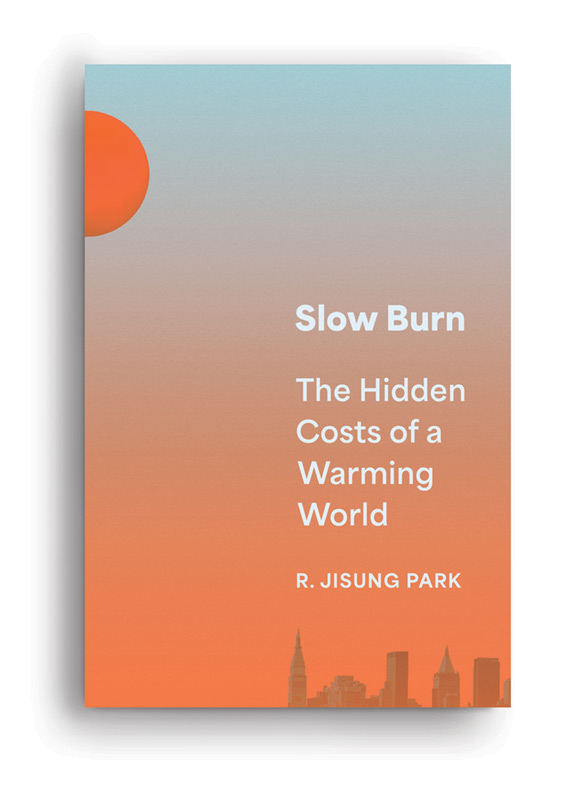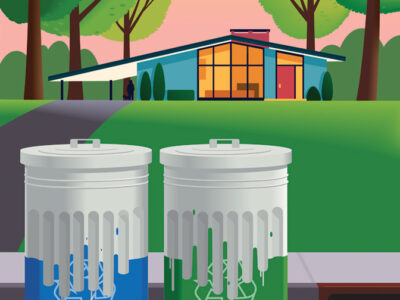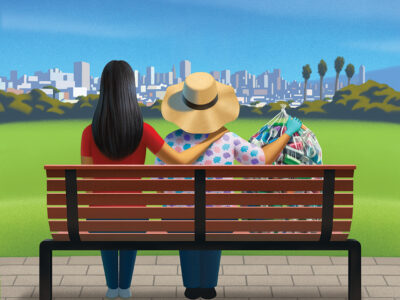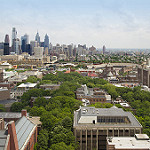
In a new book, a Penn labor and environmental economist assesses the everyday—and often unseen—implications of a warming world.
Growing up, R. Jisung Park always loved the natural world. So it wasn’t surprising that climate change would become a professional focus.

Now an assistant professor at Penn’s School of Social Policy & Practice, where he is a labor and environmental economist, Park is out with a new book, Slow Burn: The Hidden Costs of a Warming World (Princeton University Press), which builds on his research in those areas. The main argument is that we should tone down the doomsday rhetoric while paying closer attention to the sub-apocalyptic costs of global warming, which Park contends are worse than generally assumed. He aims to turn readers away from harmful fatalism and toward concrete efforts to make things better in two ways: by ameliorating the human impacts already at hand, and by cutting emissions any way we plausibly can.
Gazette contributor Daniel Akst C’78 asked Park about the ways climate change is already affecting people’s lives and how we should cope with the possibility, however remote, of catastrophic consequences down the road. The interview was edited and condensed for clarity.
Broadly speaking, how do you think about climate change?
I think we need to use two complementary frameworks. One is the framework of catastrophe insurance. We use that framework when we’re faced with various high pain, low probability scenarios. We get life insurance in case of death, and we insure our homes against total loss in a fire. Mitigating climate change should be thought of as a kind of disaster insurance because of the unknowns. There is some real but hard-to-measure risk of our climate system falling off the rails with devastating consequences. This prospect of apocalypse has dominated the discourse for quite a while. And maybe to the credit of climate scientists, the doomsaying has jolted many of us out of complacency and we’ve seen quite a bit of action on climate mitigation.
But I wanted to focus on another way of thinking about climate change, which is more as a slow burn. The warming earth is causing real problems today, and I think we’ve been seriously underestimating those costs. I hope that thinking that way can give us a much more concrete sense of, OK, what can we do about it?
In your research, you’ve found that warmer temperatures are hurting people in all kinds of not-so-obvious ways.
Absolutely. The impacts vary quite a bit based on where people live and how much money they have. One example is in school. We’ve found that student performance on tests suffers when exams are held on a 90-degree day in a building without air conditioning. There are many more such days in warmer countries, and a lot less air conditioning, so you can see the socioeconomic dimension of this. More broadly, rising heat levels degrade health and productivity. Heat probably kills far more people than all other natural disasters combined—and this phenomenon doesn’t require a horrendous heat wave. In the US, days in the 80s and low 90s may be responsible for just as many deaths as extreme heat, if not more. Hot days lead to more accidents at work, lower productivity, and more violence.
Many of these effects are invisible unless you go looking for them. We’ve all seen images of raging wildfires, and they kill dozens annually in this country. But the smoke downwind is probably far more deadly. The economist Marshall Burke and his colleagues estimate that increased wildfire smoke may have caused between 5,000 and 15,000 additional deaths per year from 2006 to 2018, mainly among the elderly.
What’s the impact on poorer countries?
It’s significantly more severe. In colder parts of the world, some warming may be welcome, but in places closer to the equator (most of them poor), higher temperatures will make things massively worse. Let’s just look at the number of 90-degree days annually. The average American experiences 30, the average German only 4. Compare that to over 100 for someone in Accra, Ghana; 150 in Mumbai, India, and over 200 for Abu Dhabi, in the United Arab Emirates. (Variation within countries can be just as large. While San Francisco averages one or two such days per year, Houston has over 100.) By around 2050, Accra and Mumbai could have 100 additional such days annually.
In your book you say that air conditioning can make a huge difference in mitigating the effect of rising heat in poor areas. But won’t that just make the world even warmer?
There is some cost to the climate for adding air conditioning, but what are we gaining by giving, say, a five-person household in Bangkok air conditioning for the first time? This is a family in a place where the temperature is over 90 degrees more than half of all days and expected to see maybe 100 more such days annually. What’s the benefit in terms of lives saved, improved labor productivity, enhanced learning and so forth?
As to the cost, if we can continue to decarbonize our electrical grid, well, more air conditioning on a decarbonized grid doesn’t really contribute to the climate problem. So I don’t think it’s an either/or proposition. We’re going to need more air conditioning and more clean energy as well.
A lot of what you talk about in the book falls in the category of adaptation. My sense is that this is taboo in some circles.
For a long time, it was true that those who were advocating adaptation did not take the climate problem seriously and to some extent indulged in blithe techno-optimism. I don’t think adaptation is the solution to all our problems. Climate change is a serious, generation-defining problem. But we’ve learned from the data how even non-catastrophic warming can be incredibly damaging to our health and our economic systems—and already has been. Those methods have also allowed us to say much more about what adaptation can and cannot do. So adaptation is essential, especially for helping those most vulnerable. But I’m not trying to take away from the urgency of mitigating greenhouse gas emissions, because there’s no world in which we can just let emissions keep rising and keep adapting to it.
Some young people even say they won’t have children because climate change. What do you think about that?
If you were someone who was looking forward to having children, I don’t think climate change should in any way deter you. If you’re concerned about the carbon footprint of one more child, honestly, I don’t see population growth as really a main challenge when it comes to climate change. We have the technology to significantly reduce the carbon intensity of our lives. We just need to make the investment. If we put the proper price on carbon, a price reflecting the harms that are increasingly clear, these investments make obvious sense.
Now let’s say you’re concerned that your child would have nothing to look forward to aside from some climate apocalypse. Hopefully the book makes this issue a little bit clearer. The evidence we have suggests that climate change will be a significant damper on quality of life for many hundreds of millions, if not billions of people. But it’s an incremental change. I don’t see it as a step change in what it means to be a human being on this planet. So I would think of it as one of many other concerns that you would weigh as a potential parent, right along with social media and the threat of nuclear war.
Adaptation implies that people can and should do something rather than just assuming the end of the world and going about their business.
We’ve actually made a lot of progress already. And again, that isn’t to take away from the real work ahead. But over the last 10 years, actual emissions cuts and the projected and committed emissions represent meaningful movement in the right direction, which is something that I think the sky-is-falling subtext of the climate narrative often obscures. The more we can ground that conversation in a sober but hopeful kind of narrative, I think that would do a lot to help sustain positive change. Because I do worry about the extent to which the motivating force behind our climate conversations has been fear. It is not easy to replace fear with a sober recognition of hard truths followed by a sense of active hope. But that is certainly the goal of my book.
How has your work on global warming changed your perspective on the subject, and on the wider world?
I grew up wanting to be a biologist. That was my dream. And I thought that the destruction of nature was one of the most devastating and morally disturbing issues of our time. I had thought of it mostly from the perspective of humans destroying plants and animals and mother nature. But more recently I’ve been struck by the tremendous impact our fossil fuel habit has had on humans. I think it’s easy to forget here in the developed world just how many people live in these very hot places.




